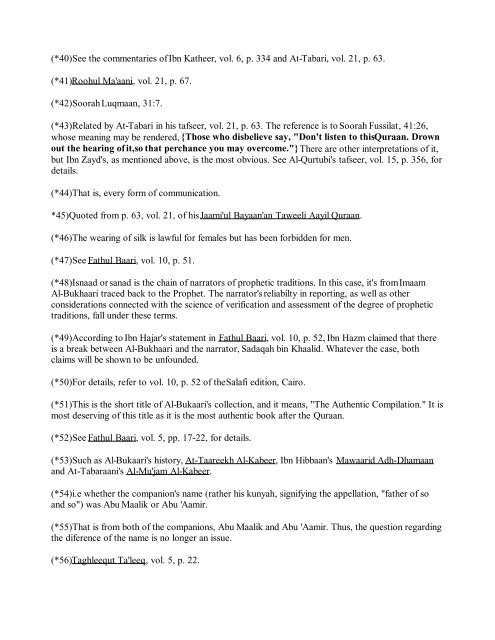The Islamic Ruling on Music and Singing - Enjoy Islam
The Islamic Ruling on Music and Singing - Enjoy Islam
The Islamic Ruling on Music and Singing - Enjoy Islam
Create successful ePaper yourself
Turn your PDF publications into a flip-book with our unique Google optimized e-Paper software.
(*40)See the commentaries of Ibn Katheer, vol. 6, p. 334 <strong>and</strong> At-Tabari, vol. 21, p. 63.<br />
(*41)Roohul Ma'aani, vol. 21, p. 67.<br />
(*42)Soorah Luqmaan, 31:7.<br />
(*43)Related by At-Tabari in his tafseer, vol. 21, p. 63. <str<strong>on</strong>g>The</str<strong>on</strong>g> reference is to Soorah Fussilat, 41:26,<br />
whose meaning may be rendered, {Those who disbelieve say, "D<strong>on</strong>'t listen to this Quraan. Drown<br />
out the hearing of it,so that perchance you may overcome."} <str<strong>on</strong>g>The</str<strong>on</strong>g>re are other interpretati<strong>on</strong>s of it,<br />
but Ibn Zayd's, as menti<strong>on</strong>ed above, is the most obvious. See Al-Qurtubi's tafseer, vol. 15, p. 356, for<br />
details.<br />
(*44)That is, every form of communicati<strong>on</strong>.<br />
*45)Quoted from p. 63, vol. 21, of his Jaami'ul Bayaan'an Taweeli Aayil Quraan.<br />
(*46)<str<strong>on</strong>g>The</str<strong>on</strong>g> wearing of silk is lawful for females but has been forbidden for men.<br />
(*47)See Fathul Baari, vol. 10, p. 51.<br />
(*48)Isnaad or sanad is the chain of narrators of prophetic traditi<strong>on</strong>s. In this case, it's from Imaam<br />
Al-Bukhaari traced back to the Prophet. <str<strong>on</strong>g>The</str<strong>on</strong>g> narrator's reliabilty in reporting, as well as other<br />
c<strong>on</strong>siderati<strong>on</strong>s c<strong>on</strong>nected with the science of verificati<strong>on</strong> <strong>and</strong> assessment of the degree of prophetic<br />
traditi<strong>on</strong>s, fall under these terms.<br />
(*49)According to Ibn Hajar's statement in Fathul Baari, vol. 10, p. 52, Ibn Hazm claimed that there<br />
is a break between Al-Bukhaari <strong>and</strong> the narrator, Sadaqah bin Khaalid. Whatever the case, both<br />
claims will be shown to be unfounded.<br />
(*50)For details, refer to vol. 10, p. 52 of the Salafi editi<strong>on</strong>, Cairo.<br />
(*51)This is the short title of Al-Bukaari's collecti<strong>on</strong>, <strong>and</strong> it means, "<str<strong>on</strong>g>The</str<strong>on</strong>g> Authentic Compilati<strong>on</strong>." It is<br />
most deserving of this title as it is the most authentic book after the Quraan.<br />
(*52)See Fathul Baari, vol. 5, pp. 17-22, for details.<br />
(*53)Such as Al-Bukaari's history, At-Taareekh Al-Kabeer, Ibn Hibbaan's Mawaarid Adh-Dhamaan<br />
<strong>and</strong> At-Tabaraani's Al-Mu'jam Al-Kabeer.<br />
(*54)i.e whether the compani<strong>on</strong>'s name (rather his kunyah, signifying the appellati<strong>on</strong>, "father of so<br />
<strong>and</strong> so") was Abu Maalik or Abu 'Aamir.<br />
(*55)That is from both of the compani<strong>on</strong>s, Abu Maalik <strong>and</strong> Abu 'Aamir. Thus, the questi<strong>on</strong> regarding<br />
the diference of the name is no l<strong>on</strong>ger an issue.<br />
(*56)Taghleequt Ta'leeq, vol. 5, p. 22.

















